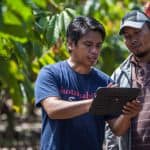The Trouble with ‘Free’: Why Treating the Poor as Customers Works Better than Charity
The need for clean, safe water has become one of the most critical issues facing our world. Lack of access to safe water is a leading cause of illness in developing countries, particularly for kids. The United Nations has stated that 80 percent of illnesses and death in the developing world are water related.
Yet both governments and development organizations have struggled to find ways to address the problem – something I know from experience.
My family’s foundation (Familia de las Americas) tried for many years to tackle this problem by distributing free ceramic filters in my home country of Guatemala. Ceramic pot filtration has proven to be an effective clean water solution – it removes bacteria and parasites from water, and is culturally accepted by customers, who often object to the taste of water that’s purified by chlorination. Yet when our foundation gave away filters in poor communities, our dependence on donations limited us to reaching only about 2,000 families a year. And besides being financially unsustainable, this approach was frequently ineffective, as recipients of the free filters often neglected to use them.
A Better Approach
As I was contemplating these challenges, I went into the field to meet real families that were living with unsafe water every day. The typical rural family lives in a hut with a dirt floor and an open pit fire. These fires are the reason respiratory infections are the number one illness in the country. But as I observed what rural families had in their homes, I would often see a flat screen TV in the middle of the room, mobile phones and sometimes a satellite dish, to watch the final of the World Cup. There was clearly an issue of prioritization in how these rural families were spending the little income they had in their pockets.
I also noticed water filters in some homes that were being used as garbage cans or flower pots. These families had received free filters from NGOs like ours, and because they were given to them at no cost they did not have a lot of perceived value. The NGOs were clearly seeing these families as objects of pity, and not engaging with them as real people who had dignity and could potentially solve their own problems if approached correctly.
Seeing Rural Families as Potential Customers
I thought to myself: What if I start seeing these rural families as potential customers? They were clearly buying a lot of stuff that some might say they do not necessarily “need,” in an environment where their kids were constantly getting sick with intestinal infections from unsafe water. I started having conversations with them and asking them how they made their water safe. Without exception, these families were boiling water, using three or four logs to do this every day. I asked them what the cost was to do this, and they had no idea. I went to the local firewood salesperson in one village and he told me each log was sold for about US $0.12. I did a calculation in my head and found that the average family was spending $10-$13 a month on firewood to boil water. The entire social business model of Ecofiltro was inspired by this expense.
I founded Ecofiltro with the goal of reaching 1 million families with clean water in Guatemala by the year 2020 – a lofty goal that initially seemed like a tall order. I planned to do this in a transactional way, by selling a low-cost filter to the poor. I thought it would be important to keep the price point at a level that would allow the poor to pay for the filter in three months or less, versus buying firewood to boil water. In order to do this, we developed an urban filter model: We decided to sell these higher-priced models of the filters to urban customers, helping to support our sale of lower-priced models in rural communities. Cross-subsidizing allowed us to keep the filter at a price point that was very attractive to rural customers.
This value proposition has proven compelling to our target market. In the last seven years, we have sold filters to over 250,000 rural families and over 150,000 urban homes. We are scaling, and as a social enterprise, Ecofiltro is not dependent on donors. We are profitable and constantly finding ways to accelerate our impact at the bottom of the pyramid.
Learning from Mistakes
Our path hasn’t always been an easy one, however. One of the great mistakes we made – and one that we have started to address – is the presentation of the rural filter model. We had always focused on keeping the cost of the filter very low, so that a poor family would not have a financial reason not to buy. So we sold our filters in a 20 liter plastic bucket that was not attractive at all. We were essentially selling a filter in a paint bucket.
It finally hit me that the rural poor are just like us: They want good-looking products. They want aspirational products that they can show off to their neighbors. So this past month we launched our new low-cost aspirational models: They are modern-looking and colorful and we cannot keep them in inventory. They are being purchased all over the countryside at a faster rate than our previous low-cost model, even though we priced them 20 percent higher.
It now seems realistic to think that we will reach our goal of providing 1 million families with clean water by the year 2020. The combination of a transactional approach that sees the poor as real customers, combined with attractive low-cost filters with a great value proposition seems to be a winning strategy. Guatemala’s rural poor now have a clean water solution that protects their dignity, since they are appreciated customers of ours, not objects of charity. And we have the financial ability to continue to grow our factory and introduce more innovative products in the marketplace.
Editor’s Note: This article was voted by readers as one of NextBillion’s Most Influential Articles of 2018.
Philip Wilson is the founder and CEO of Ecofiltro.
Image provided by Ecofiltro.
- Categories
- Social Enterprise, WASH



